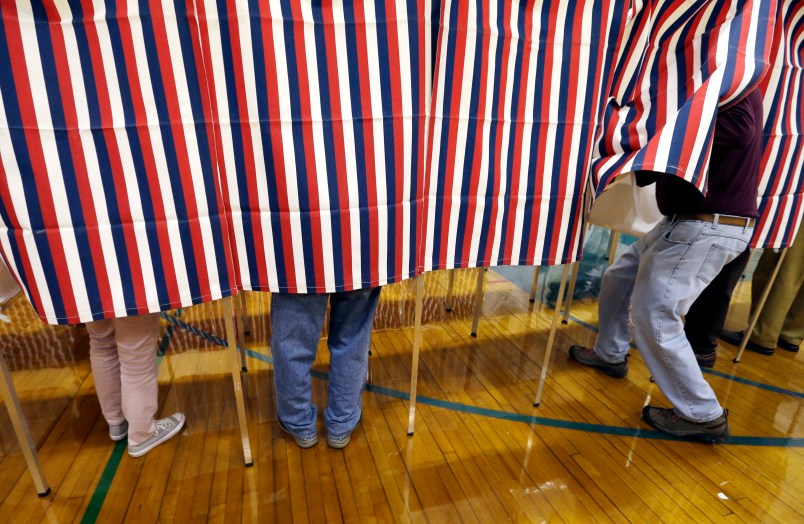A New Hampshire judge blocked a controversial voter registration law in the state for the 2018 elections, in a preliminary Monday ruling that said that the burdens imposed by the law were “unreasonable and discriminatory.”
The law, passed by the Republican-controlled legislature in 2017, expanded the state’s domicile requirements and overhauled the language on the voter registration form in a way that Judge Kenneth Browne said was “inherently confusing or misleading.” The judge ruled that those challenging the law were likely to succeed on the merits to prove the new rules violated the state’s constitutional right to vote.
New Hampshire has same-day voter registration. Under the 2017 law, those registering on election day, or within 30 days of it, who do not have with them the documents required to show they are residents in the town in which they’re voting must sign a form vowing to provide copies of those documents within a certain time period or face a penalty for voter fraud. (Those registering prior to the 30 days before election had to show the documents upon registration.)
The law was passed after Republican Sen. Kelly Ayotte was narrowly defeated in 2016, and was joined by another GOP-backed voting restriction, which is set to go into effect next year, that narrows who is considered eligible to vote under the state’s domicile requirements. Critics say the new requirements seemed geared to discourage college students in the state, who may not have easy access to the types of domicile documents New Hampshire now requires, from voting.
Brown’s decision Monday brought up the testimony of students who said they found the form confusing, while raising concerns about the timing of the deadline to provide the documents, which fell as they were taking final exams and preparing to head home for the Thanksgiving holiday. The judge also pointed to the effect that the new requirement could have on polling place wait times, and the “the stress of trying to understand the forms while standing at the head of a line of potentially hundreds of voters waiting their turn.”
One expert witness testified that portions of the new forms were written at a doctoral candidate’s reading level, according to Brown’s decision.
The law’s “forms are drafted in a matter that makes them confusing, hard to navigate and comply with with, and difficult to complete in a timely manner,” the judge said, while also noting its disparate impact on homeless people.
Judge Brown also brought up how extremely rare voter fraud is. He noted that in the very few instances of voter fraud convictions in the state in recent years, none had to do with abuse of the less complicated affidavit that voters had to sign attesting to they had domicile in the state before this new law went into effect.
“Given the extraordinarily low rate of documented voter fraud in this state, it is far more likely that legitimate voters will be dissuaded from voting than illegitimate voters will be prevented,” he said.
In blocking the new law, the judge ordered that for the election this year, officials use the domicile affidavit used in 2016.
Read the decision below:







Cases like this show how important it is that the Republicans don’t succeed in completely stacking the courts with conservative judges. We need sane judges who are not beholden to the Federalist Society.
As per plan, the damage is already done. This will zing around in the courts for a long while after the election is over (and people failed to register for fear of being prosecuted for “voter fraud”) until it winds up in front of the aforementioned hand picked conservative activist judges who will see no problem with it. Only cure is for Democrats to get a majority and remove the law.
It is becoming pretty plain that in many areas we are not that far from the vote belonging to land owning whites
Hear, hear.
“Given the extraordinarily low rate of documented voter fraud in this
state, it is far more likely that legitimate voters will be dissuaded
from voting than illegitimate voters will be prevented,” he said.
Low rate!? What about the 3M Mexicans (more illegals than the population of New Hampshire) who voted in New Hampshire in 2016 after they completed Spanish language affidavits?
And Corey Lewandowski personally saw busloads of Massachusetts voters coming here in 2016 because they knew Mass would go Democratic and didn’t want to waste their votes.